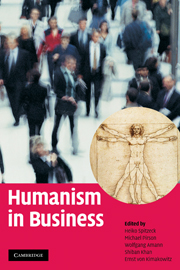Book contents
- Frontmatter
- Contents
- List of figures
- List of tables
- List of editors and contributors
- Acknowledgements
- Humanistic Management Network: paving the way towards a life-serving economy
- Introduction
- Part 1 Philosophic-historical grounding of humanism
- 1 Philosophical grounds of humanism in economics
- 2 The humanist tradition
- 3 Humanism and culture: balancing particularity and universalism among the world's religions
- 4 A requisite journey: from business ethics to economic philosophy
- 5 The global economy from a moral point of view
- 6 The implications of humanism for business studies
- 7 Current trends in humanism and business
- Part 2 Towards an integration of humanism and business on a systems level
- Part 3 Humanistic management
- Part 4 The individual as a change agent for a humane business society
- Index
- References
5 - The global economy from a moral point of view
Published online by Cambridge University Press: 25 January 2011
- Frontmatter
- Contents
- List of figures
- List of tables
- List of editors and contributors
- Acknowledgements
- Humanistic Management Network: paving the way towards a life-serving economy
- Introduction
- Part 1 Philosophic-historical grounding of humanism
- 1 Philosophical grounds of humanism in economics
- 2 The humanist tradition
- 3 Humanism and culture: balancing particularity and universalism among the world's religions
- 4 A requisite journey: from business ethics to economic philosophy
- 5 The global economy from a moral point of view
- 6 The implications of humanism for business studies
- 7 Current trends in humanism and business
- Part 2 Towards an integration of humanism and business on a systems level
- Part 3 Humanistic management
- Part 4 The individual as a change agent for a humane business society
- Index
- References
Summary
There are many moral points of view and each one thinks it has a claim to our affections. In fact, the Chinese philosopher and jurist Mo Ti argued that each and every person has his or her own unique, particular, and completely idiosyncratic moral basis for judging the things of this world and the next. It is therefore impossible, Mo Ti argued, to arrive at a common standpoint for evaluation of something as complex and important as the global economy.
So, in the context of this book, it is initially difficult to decide upon which moral point of view has the most salience from which to offer a credible critique of the global economy. From which vantage-point should we sharpen the edge of our evaluative powers? Whose perspective should we embrace? Whose benefits should we endorse? A necessary preliminary observation points out that considerations regarding the economy are very much rooted in the material, non-transcendental reality of the life-world. On the other hand, morality, from whatever point of view you take it, is not necessarily bound by the physical restraints and causal sequences that drive the life-world. Morality is open to the outer limits of human imagination, embracing all mental constructions about the workings of the life-world and all that which might be beyond the life-world.
I want to suggest in this chapter that, of all the possible moralities that could be brought to bear in analysis of the global economy, an aspect of humanism – stewardship – has a particular relevance.
- Type
- Chapter
- Information
- Humanism in Business , pp. 84 - 100Publisher: Cambridge University PressPrint publication year: 2009
References
- 1
- Cited by



